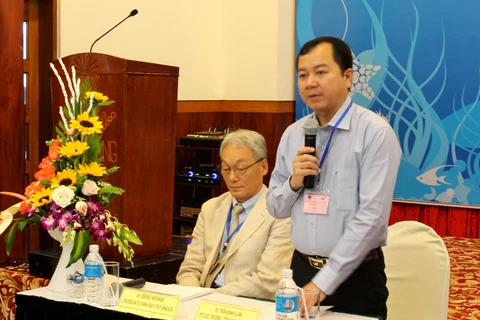Khanh Hoa (VNA) –Seaweed farming is growing as a lucrative business in coastal provinces, providing big income for farmers and helping improve local marine environment.
Vietnam now has about 10,000 hectares of seaweed with more than 101,000 tonnes of fresh seaweed harvested annually. Seaweed is mostly grown in the coastal areas of northern Vietnam (6,600 hectares) and the north central coastal region (2,000 hectares) and the south central coastal region (1,400 hectares).
Seagrape, a species of seaweed, was first grown in central coastal Khanh Hoa province since 2004 and the local area of the plant has been expanded to produce enough for exports.
Seaweed farming has great advantages over other sea products. The plant can be harvested year-round and is less vulnerable to natural disasters like storm or flooding. It also helps clean the environment of cultivated areas, said Le Nhut, chairman of Dai Duong JSC – a local seaweed supplier in Khanh Hoa.
Seagrape has been exported to Japan and the EU at a price of 110,000 VND per kilogramme for fresh seagrape while the dried product is fetched three times higher than the fresh.
Many provinces have developed successful farming systems that cultivate seaweed together with fish and other species, such as shrimp, sweet snail, sea cucumber, and green-clipped mussels, said Dr. Thai Ngoc Chien from the Research Institute for Aquaculture No.3.
The integrated seaweed farming systems have proved to be more efficient and profitable than fish-only or seaweed-only systems as seaweed helps recycle fish wastes and the fish and sea species grow faster, Chien added.
Experts believed that the Mekong Delta, where aquaculture has been heavily affected by saltwater intrusion over the past few years, should study to apply such systems in order to reduce pollution and turn it into a sustainable livelihood for local residents.
Though seaweed farming has a very promising future in Vietnam, it faces a number of challenges, particularly outdated harvesting, preservation and processing technologies to ensure good product quality.
President of BIOFARMS Vietnam Nguyen Huu Dung proposed the government to join hands with farmers to study environment effects of the seaweed industry, apply advanced processing technologies, and look for more export markets.-VNA
VNA





















